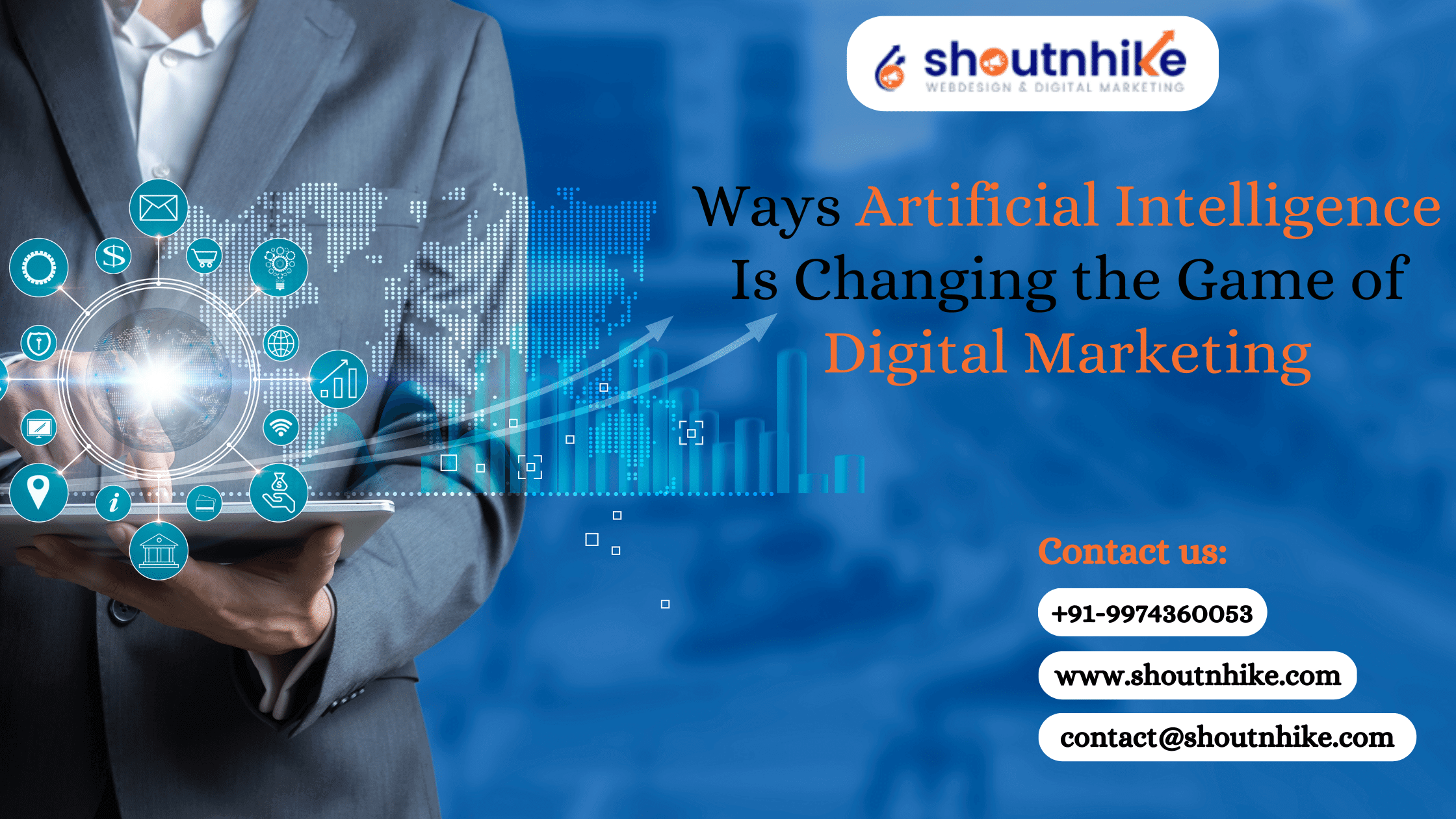Ways Artificial Intelligence Is Changing the Game of Digital Marketing

As the digital revolution continues to expand and evolve, more businesses than ever before are relying on Artificial Intelligence (AI) to help them take their marketing strategies to all-new levels. In this modern era of technology, AI is becoming an essential tool for staying ahead in digital marketing – offering countless opportunities for maximizing ROI and optimizing campaigns for maximum impact. Lots of renowned digital agency based in Ahmedabad, India. From automated customer service systems to chatbots and personalization capabilities, explore how AI has become a game changer in helping brands reach new heights with their online presence.
How AI is used in digital marketing?
AI offers a range of benefits to digital marketers and can help them improve their campaigns. AI can be used to optimize the reach of ads, target specific audiences, identify potential customers, personalize content, analyze the performance of campaigns, recommend new strategies and tactics, and even automate certain tasks. By leveraging AI technology, marketers can gain insights into customer behavior that would otherwise be difficult or impossible. This allows them to craft more effective campaigns and maximize their return on investment (ROI).
Additionally, AI-powered automation tools can save valuable time for marketers by automating laborious processes such as data entry and analysis. With AI-based tools taking care of mundane tasks like these, marketers have more time to innovate strategic campaigns to help them stand out from their competitors. AI-powered marketing technology is revolutionizing the way digital marketers operate and will continue to be an integral part of marketing shortly.
The possibilities for AI-driven marketing are endless, but there are some important steps to consider when implementing AI into your digital strategy. First, it’s important to understand how AI works and how you can use it effectively within your business. Once you clearly understand this technology, you need to evaluate which strategies and tactics make sense, given your specific goals and objectives.
How can it help?
1. AI-powered customer segmentation:
AI can segment customers into groups by analyzing their behavior, preferences, and past purchases. This allows marketers to accurately target the right audience with their messages based on what they have been proven to respond to.
2. Optimized content creation:
AI can help marketers create better content by understanding consumer needs and interests through natural language processing (NLP) algorithms. By leveraging insights from data collected about user interactions, AI can craft more relevant content that resonates with the target audience.
3. Automated personalization:
Using advanced machine learning techniques, AI can be trained to optimize web pages automatically for each visitor in real time according to their browsing behavior and interests. This allows webpages to be tailored to each customer’s specific needs, leading to higher conversion rates.
4. Predictive analytics:
AI can help marketers predict future trends and behaviors by analyzing past data sets such as purchase histories, demographic information, etc. With this knowledge, marketers can design effective campaigns that are better targeted at their ideal customers.
5. Automated campaign management:
AI enables marketers to automate many aspects of running a successful marketing campaign from start to finish, freeing up time for them to focus on creative tasks or develop strategic plans. AI can optimize budgets based on performance metrics to set up ad scheduling or A/B testing ads for maximum efficiency.
6. Optimized ad targeting:
AI can help marketers target the right audience with their ads by analyzing customer data and understanding user preferences. With AI, marketers can create highly targeted campaigns tailored to each individual’s interests – leading to higher conversion rates.
7. Automated optimization:
AI algorithms can constantly optimize a digital marketing campaign in real-time according to performance metrics such as clicks, impressions, and conversions. This allows campaigns to be tweaked and adjusted to maximize return on investment (ROI).
8. Measurement & Reporting:
AI helps marketers track key performance indicators (KPIs) in real-time to identify which strategies are working and which need improvement. AI-powered analytics tools can generate detailed reports on the performance of campaigns, allowing for data-driven decision-making.
AI provides many opportunities for marketers to make their digital marketing efforts more efficient and effective. By leveraging AI’s power to automate tasks, optimize ad targeting, measure performance metrics, and more – marketers can level up their game and drive better results in less time. Integrating AI into digital marketing strategies is a powerful way to stay ahead of the competition.
What are the benefits of using AI to optimize content and campaigns?
1. Improved Performance:
AI-optimized content has been proven to outperform manual efforts in terms of both reach and engagement. AI algorithms can quickly identify the best-performing content, allowing for significantly improved results compared to traditional methods.
2. Greater Efficiency:
Automated content optimization reduces the time spent on manual research and analysis needed to determine what works and what doesn’t with campaigns. This saves time and resources, meaning organizations can focus on other tasks, such as creating quality content or exploring new marketing strategies.
3. Better Targeting:
By using AI-driven tools to analyze customer data, organizations can more accurately predict consumer behaviors and create highly targeted campaigns that deliver personalized experiences for each user.
4. More Accurate Predictions:
AI algorithms can quickly and accurately sift through large amounts of data to identify patterns and trends that humans may not as easily spot. This allows marketers to make more informed decisions about their content and campaigns, ultimately leading to improved performance outcomes.
5. Increased Scalability:
AI-optimized campaigns are designed to be scalable and can accommodate larger user populations without additional resources or manpower. This is especially beneficial for organizations with limited budgets who need effective ways to reach larger audiences with minimal outlay.
What AI can’t do?
Despite all the advancements in AI technology, there are still certain areas where AI cannot match human capabilities.
1. AI lacks common sense:
Artificial intelligence systems cannot understand and apply common sense knowledge. This means that they can only respond to questions within the scope of their programming and lack the capacity for creativity or independent decision-making.
2. AI struggles with uncertainty:
Machines have difficulty dealing with situations where data is incomplete or uncertain due to their reliance on predetermined rules and algorithms to make decisions. When faced with a situation outside of its programming parameters, an AI system may struggle to form a response or make illogical decisions due to its inability to reason without sufficient data.
3. AI has a limited understanding of language:
AI systems are very good at understanding large volumes of structured data but still struggle to understand the nuances and complexities inherent in natural language. As such, AI cannot fully comprehend and produce realistic conversations, meaning it is unsuitable for use as a conversational agent or chatbot.
4. AI lacks emotional intelligence:
AI systems cannot effectively process emotions, so they cannot properly empathize with human beings. This limits their ability to interact naturally with humans and respond appropriately according to social norms and cultural mores.
In conclusion, while incorporating AI into digital marketing has many benefits, it’s important to be aware of the potential challenges that may arise. By understanding these risks and taking steps to mitigate them, companies can ensure they get the most out of their AI investments.











